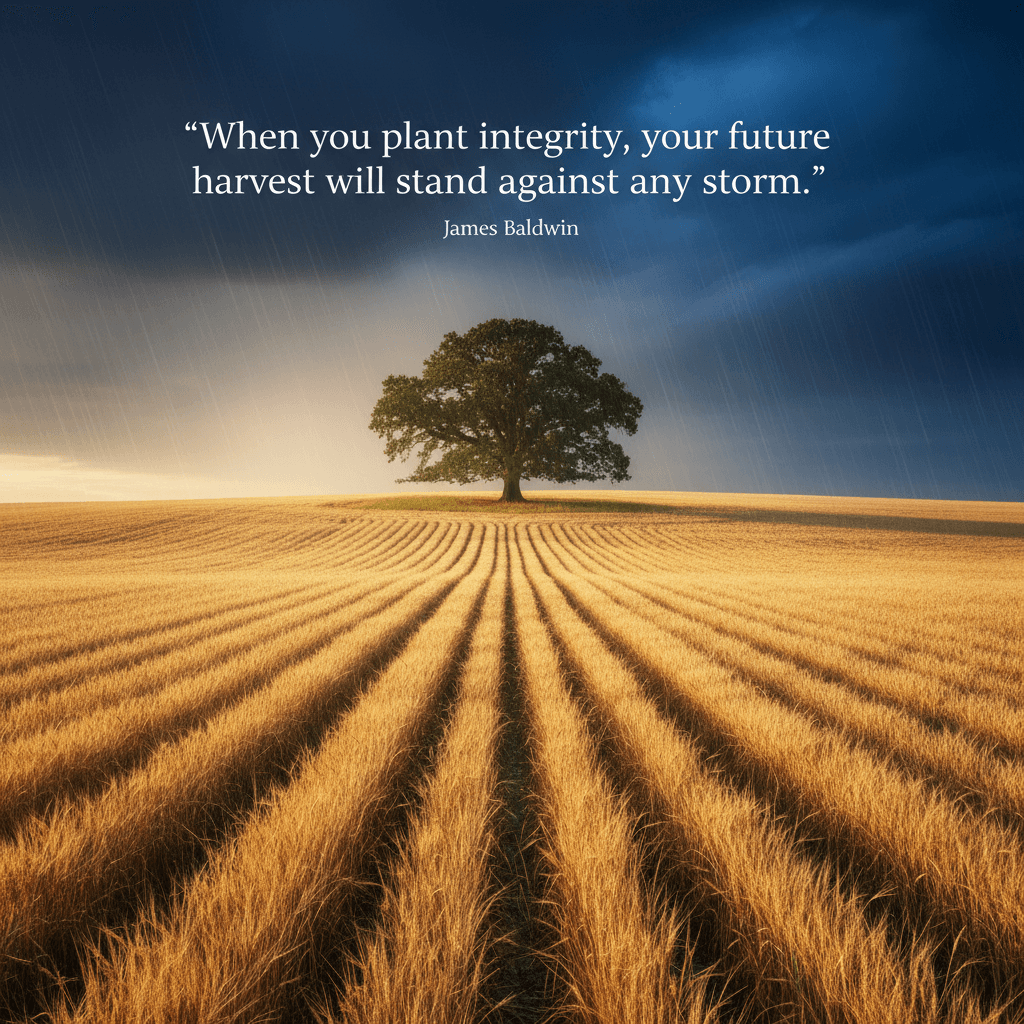Sow Integrity, Reap Resilience Through Life's Storms

When you plant integrity, your future harvest will stand against any storm. — James Baldwin
The Seed and the Season
First, the agrarian metaphor makes the principle visceral: integrity is a seed, not a slogan. To plant it is to choose consistent, honest action before the weather turns, accepting that roots deepen slowly and out of sight. Storms—crises, temptations, public scrutiny—will certainly come, but a crop grown from principled choices bears tensile strength that quick fixes cannot supply. In other words, the harvest is not luck; it is cultivated durability. Thus the quote reframes virtue from lofty ideal to practical agriculture: prepare the field now, endure the wind later.
Baldwin's Weathered Moral Landscape
Building on this image, Baldwin’s life and prose show how truth-telling fortifies the soul against historical tempests. In Notes of a Native Son (1955), he insists on facing painful facts without rancor or denial; in The Fire Next Time (1963), he argues that love is a rigorous discipline, not a sentiment. These works read like weather reports and repair manuals at once: they diagnose the storm and prescribe integrity as the only shelter that does not become a prison. Consequently, the aphorism’s confidence is earned—Baldwin knew that moral clarity, sown early, is what keeps the house from collapsing when the winds of history rise.
Resilience as Ethical Compound Interest
Moreover, research suggests integrity compounds over time. Character Strengths and Virtues by Peterson and Seligman (2004) treats honesty as a core virtue linked to well-being and perseverance. In organizational life, the Mayer–Davis–Schoorman model (1995) shows that integrity is a pillar of trustworthiness, which in turn predicts cooperation and performance under stress. Like compound interest, small ethical deposits—kept promises, transparent decisions, fair processes—accumulate into a reserve that cushions shocks. When disruption hits, this reserve converts into resilience: people grant grace, systems bend rather than break, and leaders can act without hemorrhaging credibility.
Case Studies of Stormproof Trust
Consider how crises reveal the crop. During the 1982 Tylenol poisonings, Johnson & Johnson pulled products nationwide at great cost, aligning with its Credo; the public trust that followed became a competitive moat often cited in business ethics courses. Similarly, after a devastating 1995 fire, Malden Mills’ CEO Aaron Feuerstein kept workers on payroll—an act of integrity that won fierce loyalty even as financial headwinds remained. These stories echo Baldwin’s thesis: integrity planted in quiet seasons yields reputational ballast when waves crest, transforming catastrophe from an ending into a passage.
Practices That Plant Integrity Daily
In practice, planting integrity means ritualizing truth and repair. Set precommitments—codes of conduct with enforcement teeth—before dilemmas arise; publish decisions and criteria to reduce hidden corners; and when errors occur, engage in swift disclosure and amends. Hospital disclosure-and-apology programs have lowered litigation costs and improved safety cultures (Kachalia et al., 2010), illustrating how transparent repair strengthens, rather than weakens, standing. In personal life, micro-habits—documented commitments, checklists, and inviting dissent—till the soil so that when pressure mounts, defaults lean toward honesty instead of expediency.
Community Fields and Shared Harvests
Finally, integrity scales from persons to polities. Elinor Ostrom’s Governing the Commons (1990) shows communities enduring environmental shocks by enforcing fair, transparent rules they trust, while Robert Putnam’s Bowling Alone (2000) links social capital to civic resilience. The implication is communal: when many people plant integrity, the shared harvest is a culture robust enough to face storms together. Thus Baldwin’s insight closes the loop—private virtue becomes public infrastructure, and the weather, however fierce, meets fields already rooted in truth.